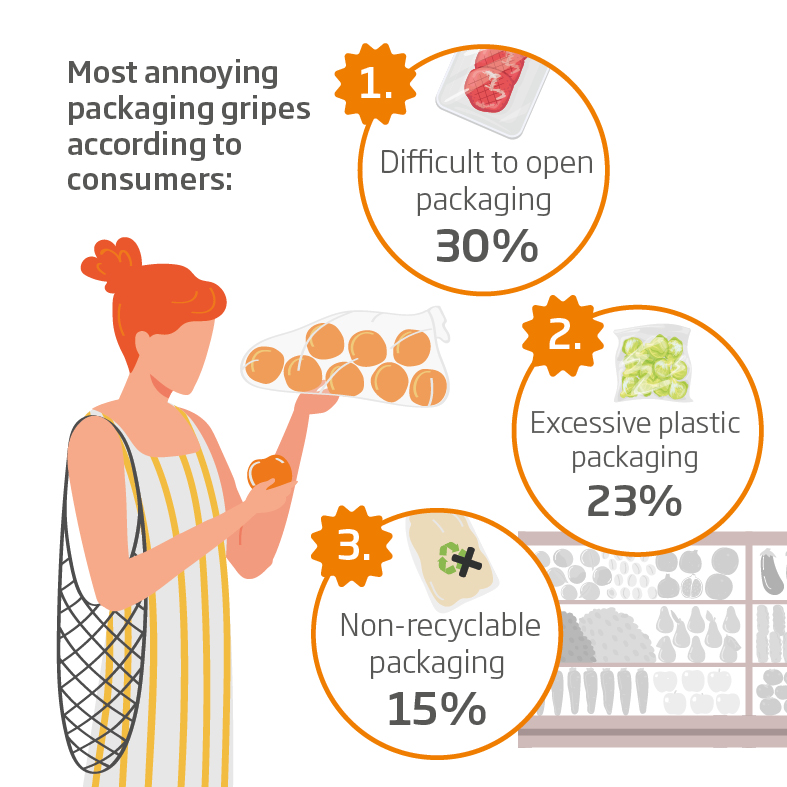New research has unveiled the biggest frustrations Brits have with supermarket packaging, highlighting issues such as excessive plastic use and non-recyclable materials. The study, commissioned by DS Smith, sheds light on how consumers feel about the packaging of products they purchase and their preferences for more sustainable options.
Key Findings
A significant 30% of respondents are particularly annoyed when fruit or vegetables are encased in excessive layers of plastic. This frustration is so pronounced that 25% of individuals admit they have avoided purchasing items due to their over-the-top packaging. Additionally, more than a quarter (28%) of consumers are dismayed by packaging that cannot be recycled.
Other common irritations include excessive layers of packaging, difficulty opening products without scissors, and poorly designed “easy peel” corners. These issues are so impactful that 44% of people say they are less likely to buy a product again if they encounter these problems. Furthermore, 21% have reported encountering unclear recycling instructions on packaging, with a third of these individuals likely to dispose of the item in general waste, while 32% would make an educated guess and place it in the recycling bin.
Consumer Willingness for Eco-Friendly Packaging
A notable 24% of consumers are willing to spend up to 33p more for items packaged in more eco-friendly ways. This indicates a significant willingness among shoppers to support sustainable practices, even if it means paying a premium. Moreover, 38% of consumers are concerned about the amount of plastic used in packaging when making purchasing decisions, prioritising this factor over the origin of the product or its recyclability. This growing consciousness reflects the increasing importance of sustainability in daily purchasing decisions.
Shift Towards Sustainable Choices
DS Smith’s research also highlights a trend towards more environmentally conscious choices. For instance, 17% of consumers are open to using paper bags for fruit, and only 5% are comfortable with plastic punnets. This shift underscores the growing demand for sustainable alternatives. Furthermore, the company’s initiatives align with the broader industry trend toward reducing plastic waste and enhancing recyclability.
DS Smith’s Achievements
This research follows DS Smith’s recent achievement of surpassing its target of replacing over 1.2 billion pieces of plastic from supermarket shelves, reaching this milestone 16 months ahead of its 2025 goal. The company has made significant strides in replacing everyday plastic items, such as fruit and vegetable punnets, plastic carriers, and shrink-wrap on soft drink bottles. Since setting this target in 2020, DS Smith has nearly doubled the annual amount of plastic pieces it has replaced.
Top 10 Packaging Irritations According to Brits:
- Meat packaging with a corner that’s impossible to peel open.
- Pull tabs on tins that come off, making them difficult to open.
- Packaging that requires scissors or a knife to open.
- Fruit or vegetables wrapped in excessive plastic.
- Packaging that isn’t recyclable.
- Packaging that makes the product look much larger than it is.
- Overpackaging with unnecessary layers.
- Packaging that is challenging to recycle.
- Items that aren’t resealable.
- Packaging that obscures the product inside.
This insight from DS Smith underscores the pressing need for more sustainable packaging solutions that meet consumer expectations and contribute to environmental conservation. As consumer demand for environmentally friendly packaging grows, companies like DS Smith are leading the charge toward a future with less plastic and more sustainable materials.



